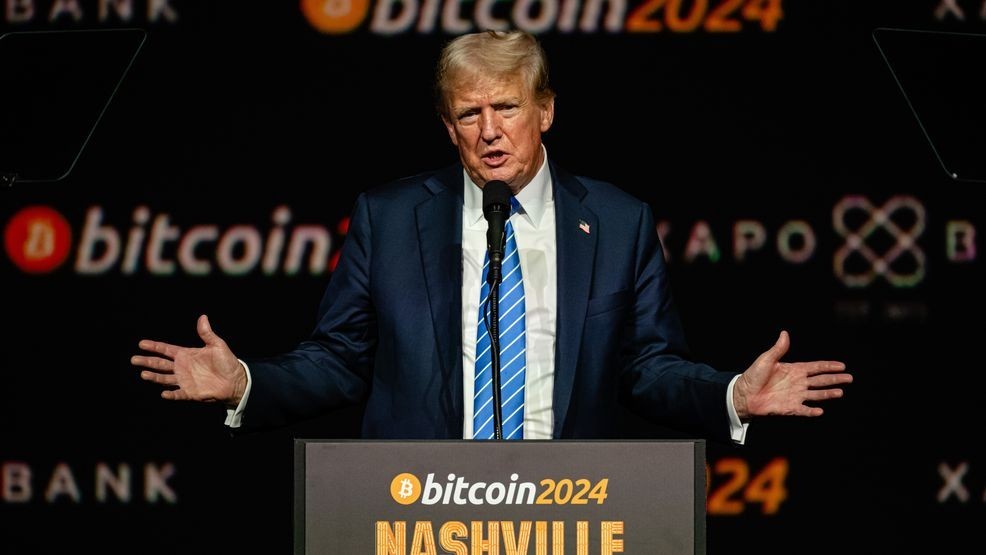- Binance CEO Gives Only Recommendation on Cryptocurrency Market
- 4 Tokens With 100x Potential
- Bybit x Block Scholes Crypto Derivatives Report
- XRP’s Path to $100: Inside Linda P. Jones’s Bold Vision and the Data Behind It
- New York Attorney General Files Lawsuit To Recover $2.2 Million in Cryptocurrency Stolen Through Job Scams
(TNND) — A tiny bit of shine came off bitcoin when Federal Reserve Chair Jerome Powell poured cold water on the idea of the U.S. government holding a cryptocurrency reserve.
Bạn đang xem: What does Trump’s crypto support mean for Americans?
But bitcoin is still riding high since Donald Trump won the White House.
Trump has voiced support for crypto and has picked crypto supporters for key roles within his administration.
Bitcoin was valued at about $69,000 on Election Day. In the weeks after Trump won the election, bitcoin surged above $100,000.
Trump spoke this summer at Bitcoin 2024, an industry conference, telling attendees that he wanted to make America the “crypto capital of the planet and the bitcoin superpower of the world.”
Some of his picks for key jobs within his administration, such as treasury secretary and Securities and Exchange Commission chair, seem to back up that pro-crypto position.
But on Wednesday, Powell, the Fed chair, said the central bank isn’t allowed to own bitcoin and isn’t looking for a law change to allow the government to hold a crypto reserve.
A day later, bitcoin, the largest and oldest cryptocurrency, was trading about 5% lower than its 24-hour high, according to CoinDesk.
“I’m not surprised the Fed chair says they will not hold a central reserve of bitcoin,” Leonard Kostovetsky, an associate professor of finance at Baruch College, said via email. “It’s not a part of the Federal Reserve’s mandate of keeping inflation and unemployment low and there is no obvious benefit to the economy from the Fed holding it. It’s also a decentralized currency so the Federal Reserve does not really play much of a role in its regulation.”
Kostovetsky, a cryptocurrency expert, also said he isn’t sure Trump’s support of crypto has a lot of impact on its legitimacy.
“But crypto market participants are certainly betting that his appointees will reduce regulations on crypto which will make it more valuable,” he said.
Xem thêm : Bitget, the Leading Cryptocurrency Exchange and Web3 Company, Announces New Phase of Wealthy Tuesday
The question of crypto regulations is not a simple one, said Roger Nober, the director of the George Washington University Regulatory Studies Center.
And it begins with simply “deciding what it is.”
“Is crypto a security? Is it a commodity? Is it nothing, like who won the coin flip at the Super Bowl, just kind of a prop bet? Or is it any or any combination of those?” Nober said. “And so, first you have to decide what it is and how to regulate it.”
The current SEC felt that cryptocurrencies were securities, like stocks, and kept trying to control them with lawsuits against exchanges or tokens, Nober said.
Many aspects of crypto are now left to the eye of the beholder.
Nober said he thinks the Trump administration will bring more clarity around crypto assets, but the approach remains murky.
“There’s a lot of ideas that are being thrown out by people, and it’s hard to know how many of them are what the administration thinks or what they don’t,” Nober siad. “I don’t know that the administration knows what it thinks. I think different people involved in the administration may think they know what it thinks or want to speak for them.”
Peter Whitehead, a senior engineer at RAND, equated cryptocurrencies to “lemon” used cars due to an inherent asymmetry of information between crypto sellers and buyers.
“In the multibillion-dollar world of cryptocurrencies, information asymmetry is an inescapable and unchecked phenomenon and, unlike in the market for used cars, there is little consumers can currently do about it,” Whitehead wrote.
Cryptocurrencies operate through blockchains, or decentralized digital ledgers.
Most Americans know little about the working of cryptocurrencies, Kostovetsky said.
He noted that a recent Motley Fool poll showed only 18% felt they understood well how crypto works.
Xem thêm : Nigeria Cracks Down on Cryptocurrency Fraud and Romance Scam
Crypto is an extremely volatile investment, he said. It can often lose or gain as much as 10% of its value in just one day.
And he said we can’t forecast crypto prices.
Unlike normal financial assets, like stocks and bonds, crypto is an asset whose entire value depends on what people are willing to pay for it at a period in time based on what they think someone else will pay for it in the future.
It is not backed by anything else, such as gold, tax revenue or corporate earnings. Kostovetsky said that makes it impossible to estimate if a particular crypto asset is overpriced or underpriced.
“The American public should approach crypto with extreme caution,” Kostovetsky said. “If people want to gamble, they can go to a casino or buy lottery tickets or bet on sports, and putting money in cryptocurrency should be seen as more similar to those activities rather than similar to investing one’s savings in stocks, bonds, or real estate.”
Nober said crypto’s instability is a deterrent to people who want to make long-term investments.
“You have to have a tolerance for risk that a lot of more mainstream (investors) don’t necessarily have,” he said.
The U.S. government holding a bitcoin reserve would be one way of demonstrating confidence in crypto.
“I think the people who are after a bitcoin reserve were perhaps after that market signal,” Nober said.
The Trump administration can foster adoption of crypto with regulatory clarity of the digital currencies.
But he said congressional legislation would be preferable for clarity and durability of the market.
“Getting Congress to act on a statutory framework, particularly for something as controversial as crypto, is a challenge,” Nober said.
Nguồn: https://gapinsurance.click
Danh mục: News




